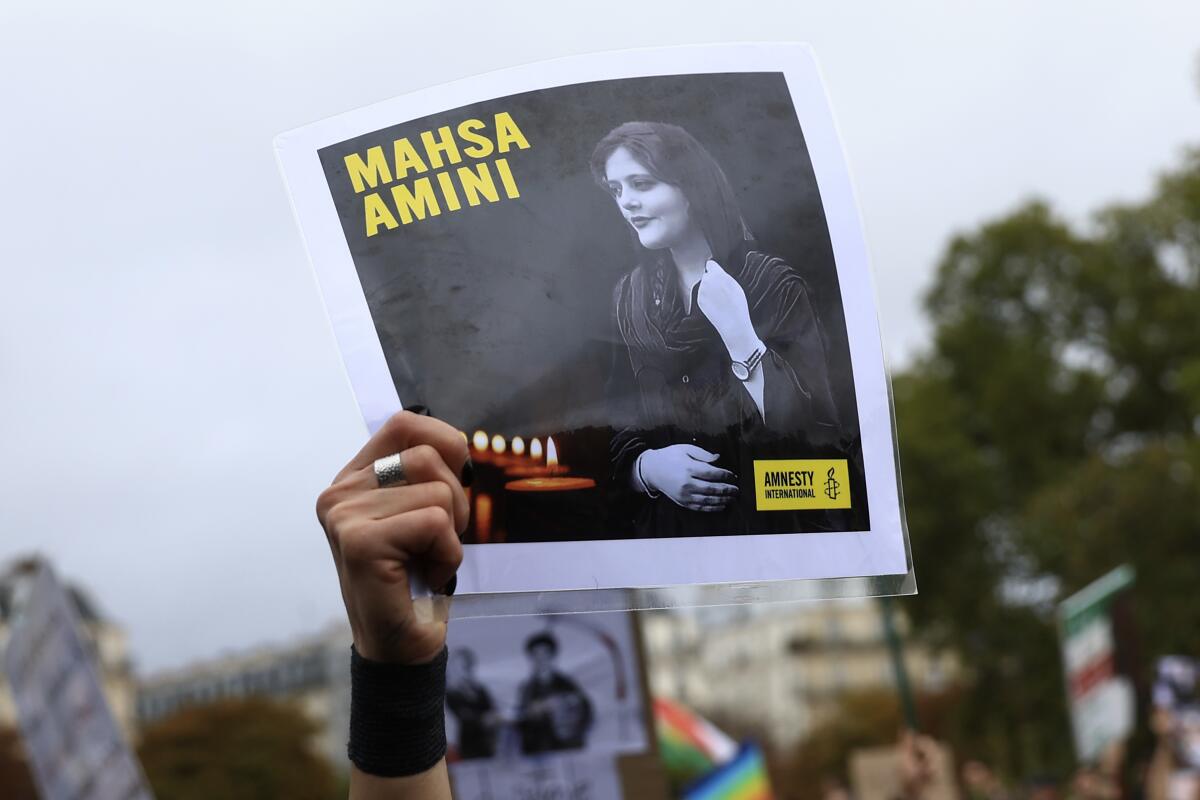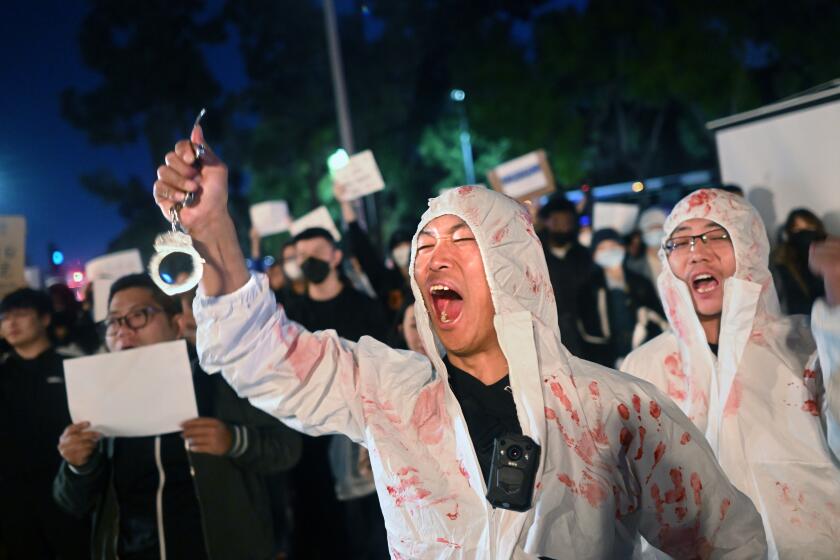Iran announces first execution of a prisoner arrested in protests

- Share via
DUBAI — Iran said Thursday that it executed a prisoner convicted of a crime allegedly committed during the country’s ongoing nationwide protests, the first such death sentence carried out by Tehran.
The execution comes as other detainees also face the possibility of capital punishment for their involvement in the protests, which began in mid-September, first as an outcry against Iran’s morality police. The protests have since expanded into one of the most serious challenges to Iran’s theocracy since the 1979 Islamic Revolution.
Activists warn that others could also be put to death in the near future, saying that at least a dozen people so far have received death sentences over their involvement in the demonstrations.
Iran’s Mizan news agency reported the execution of the man, identified as Mohsen Shekari. It accused Shekari of blocking a street in Tehran and attacking a member of the security forces with a machete. The target of the attack required stitches for his wounds, the agency said.
Mahmood Amiry-Moghaddam, director of the Oslo-based activist group Iran Human Rights, wrote that the “execution of #MohsenShekari must be me[t] with STRONG reactions otherwise we will be facing daily executions of protesters. This execution must have rapid practical consequences internationally.”
German Foreign Minister Annalena Baerbock condemned Shekari’s execution in a Twitter post, saying that “the Iranian regime’s contempt for humanity is limitless.”
Ramin Rezaeian and fellow Iranian players are in a no-win situation as they face the U.S. at the World Cup amid protests against the Islamic Republic.
The Mizan report also alleged that Shekari admitted being offered money by an acquaintance to attack the security forces. Iran’s government for months has alleged — without offering evidence — that foreign countries have fomented the unrest. Protesters say they are angry over the collapse of the economy, heavy-handed policing and the entrenched power of the country’s Islamic clergy.
Mizan said Shekari was arrested Sept. 25, then convicted Nov. 20 on the charge of “moharebeh,” a Farsi word meaning “waging war against God.” That charge has been levied against others in the decades since 1979 and carries the death penalty. Mizan said an appeal by Shekari’s lawyer against the sentence had failed before his execution.
Mizan, run by the country’s judiciary, said Shekari had been convicted in Tehran’s Revolutionary Court, which typically holds closed-door trials that have been internationally criticized for not allowing defendants to pick their own lawyers or even see the evidence against them.
After his execution, Iranian state television aired a heavily edited package showing the courtroom and parts of Shekari’s trial, presided over by Judge Abolqasem Salavati.
Attention and sympathetic responses from multi-national Los Angeles can amplify cries for justice in distant nations, and act as a buffer against censorship.
Salavati faces U.S. sanctions for meting out harsh punishments.
“Salavati alone has sentenced more than 100 political prisoners, human right activists, media workers and others seeking to exercise freedom of assembly to lengthy prison terms as well as several death sentences,” the U.S. Treasury Department said upon sanctioning him in 2019.
“Judges on these Revolutionary Courts, including Salavati, have acted as both judge and prosecutor, deprived prisoners of access to lawyers and intimidated defendants.”
Iran has been rocked by protests since the Sept. 16 death of 22-year-old Mahsa Amini, who died after being detained by the country’s morality police. At least 475 people have been killed in the demonstrations amid a harsh security crackdown, according to Human Rights Activists in Iran, a group that’s been monitoring the protests. More than 18,000 people have been detained by authorities.
Breaking News
Get breaking news, investigations, analysis and more signature journalism from the Los Angeles Times in your inbox.
You may occasionally receive promotional content from the Los Angeles Times.
Iran is one of the world’s top executioners. It typically executes prisoners by hanging.
Already, Amnesty International said it obtained a document signed by one senior Iranian police commander asking that a prisoner’s execution be “completed ‘in the shortest possible time’ and that his death sentence be carried out in public as ‘a heart-warming gesture towards the security forces.’”
More to Read
Sign up for Essential California
The most important California stories and recommendations in your inbox every morning.
You may occasionally receive promotional content from the Los Angeles Times.












